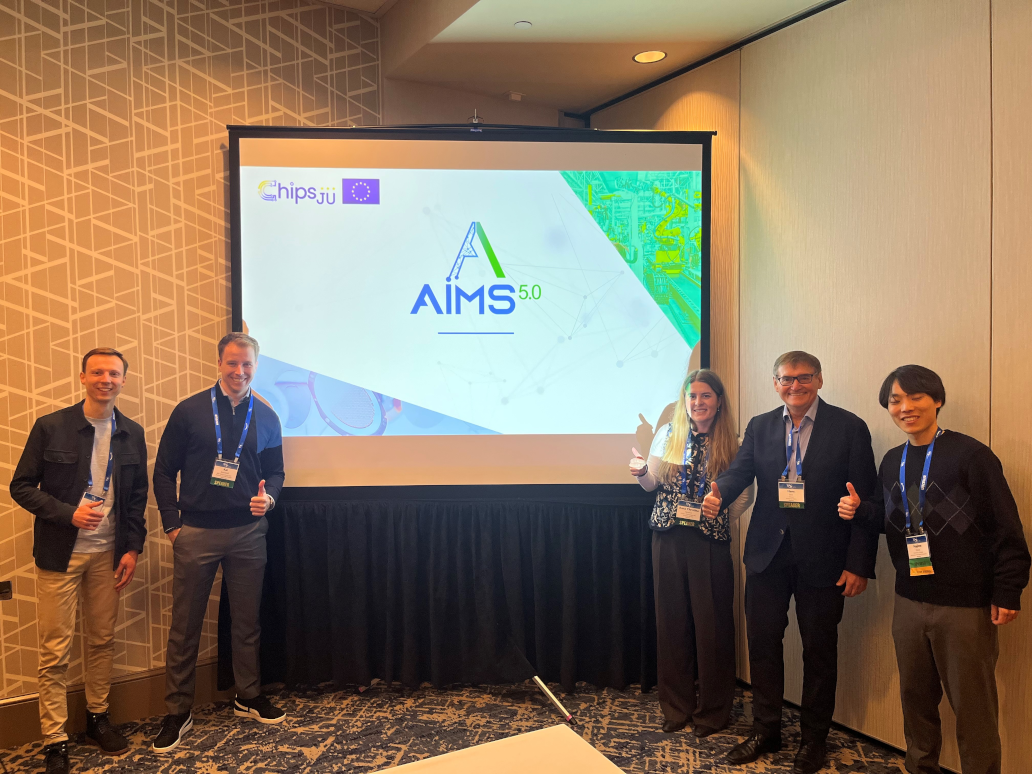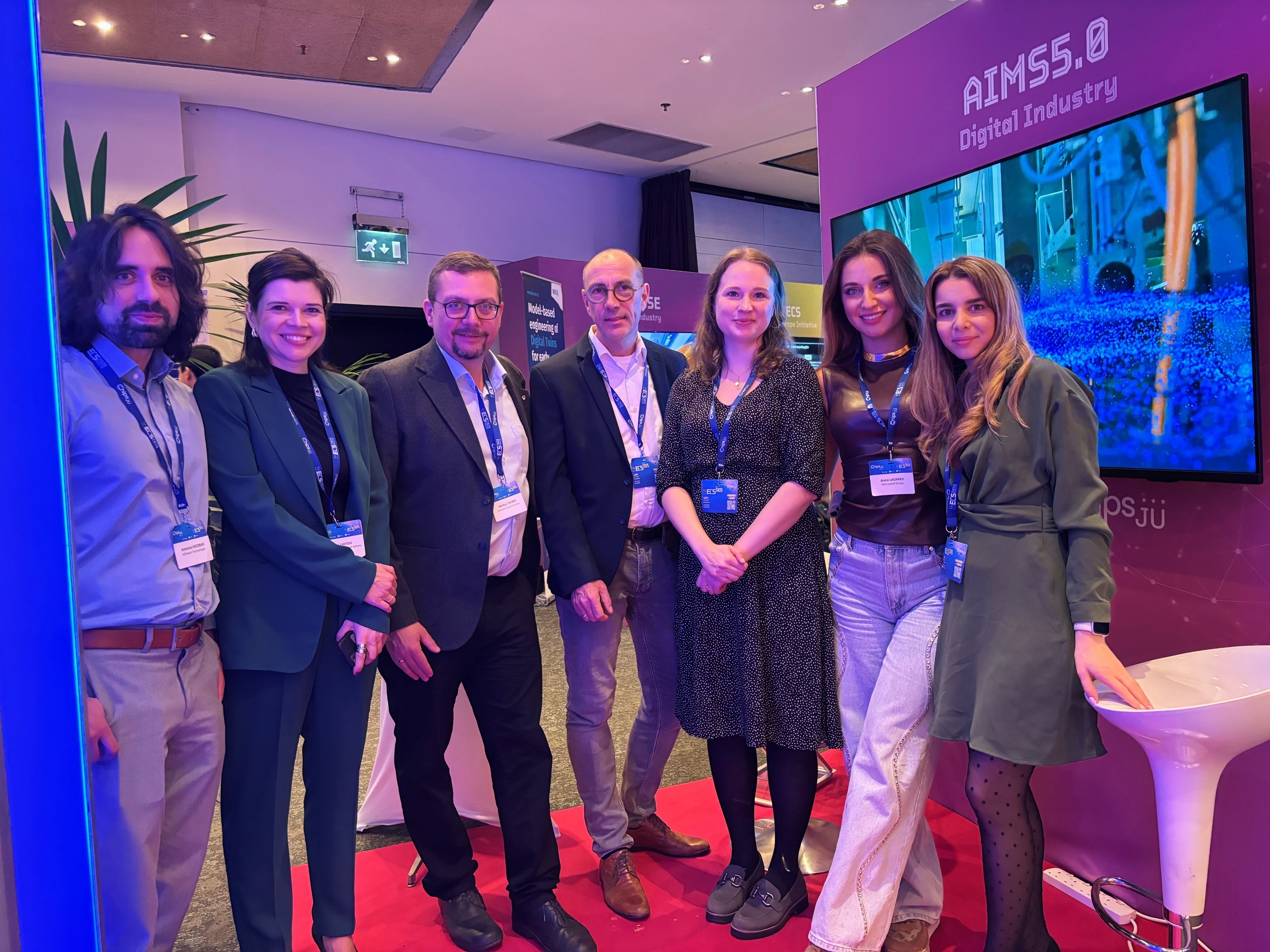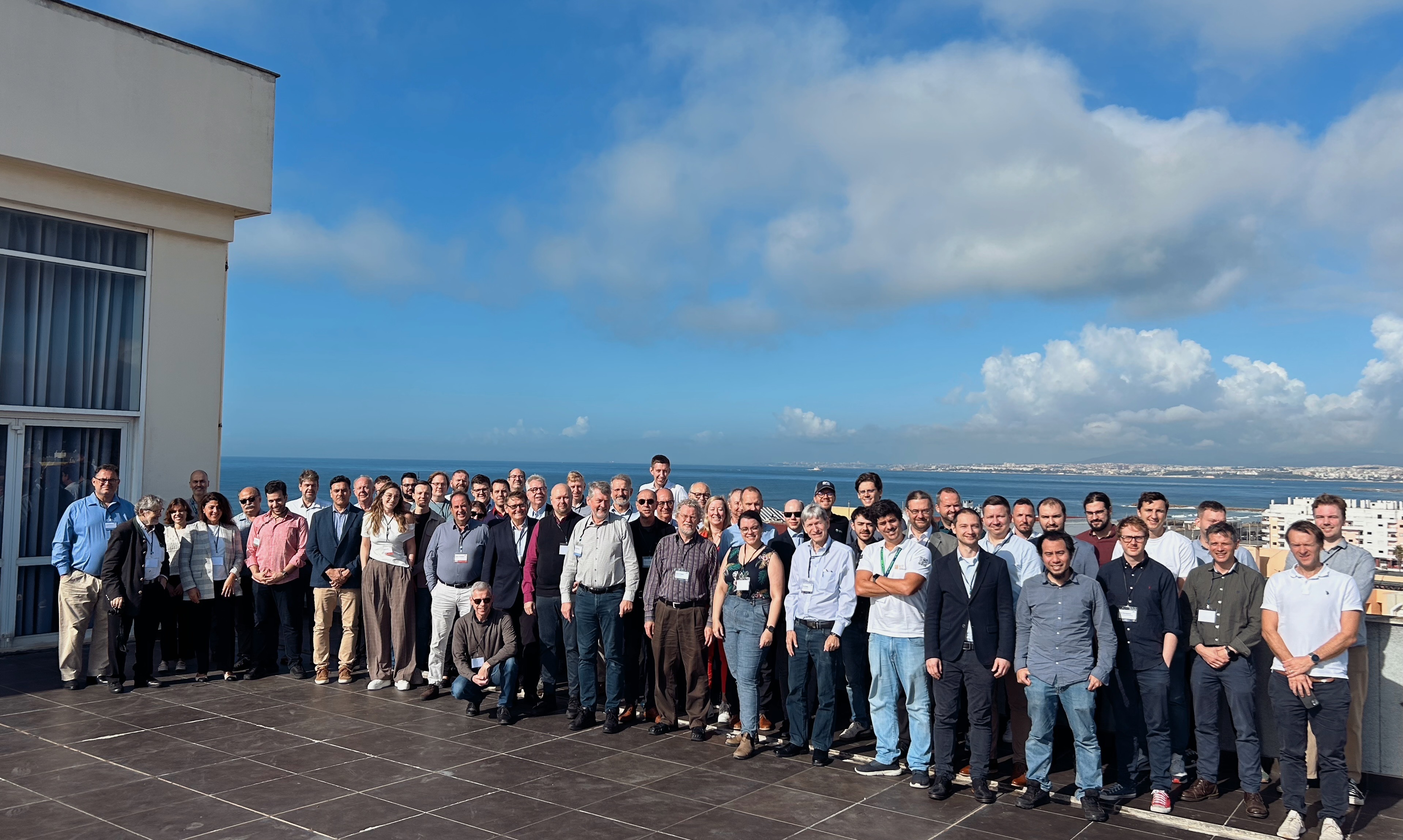AIMS5.0 - The next big step in digital transformation
News Grid

Project Results
Dezember 18 2025
1. Winter Simulation Conference 2025: Key Insights for AIMS5.0
Introduction
In December 2025, representatives of the Infineon Supply Chain Innovation team participated in the Winter Simulation Conference (WSC) in Seattle, USA. The Winter Simulation Conference is one of the leading global events for simulation experts, researchers, and industry practitioners, with around 1,000 participants from academia and industry.
The participation and research activities were supported by several EU-funded initiatives, including AIMS5.0, SC4EU, and SemiconductorX. This highlights the strong connection between European research projects and global innovation in advanced manufacturing and supply chain management.
Project Results
Dezember 9 2025
1. AIMS5.0 at EFECS Malta 2025
Roadmaps, Project Presentations and New Paths for European Chips
EFECS 2025 took place on 3–4 December at the Hilton Hotel in St Julian’s, Malta, bringing together Europe’s leading stakeholders in electronic components and systems. The forum is co‑organised by Chips Joint Undertaking together with the industry associations AENEAS, EPoSS and INSIDE, and is recognised as the key annual meeting point for Europe’s semiconductor and digital systems community.
This year’s edition was particularly strategic: it combined high‑level discussions on Europe’s technological sovereignty with concrete project presentations and the official release of new roadmaps that will guide future work in the chips domain.

Project Results
Dezember 9 2025
1. Deep Tech Collaboration Workshop — Lisbon 2025
AIMS5.0 × SC4EU × Arrowhead fVPN
Strengthening Europe’s Semiconductor Future Through Joint Innovation
At the Deep Tech Lisbon Event 2025, three leading European projects — AIMS5.0, SC4EU and Arrowhead fVPN — met in a coordinated workshop to explore cross-project collaboration, talent development, and future pathways for Europe’s semiconductor ecosystem. The session ran parallel to the SC4EU General Assembly and the Arrowhead fVPN technical meeting, bringing partners together to accelerate knowledge exchange, align priorities and support a more resilient digital Europe.

Project Results
September 19 2025
AIMS5.0 at the European Research & Innovation Days – Reflections from Brussels
The European Research and Innovation Days (RiDaysEU) are always a special moment in Europe’s calendar. For two days each September, policymakers, researchers, industry leaders, and innovators gather in Brussels to exchange perspectives on where Europe stands and where it must go in order to remain competitive in a fast-changing global landscape.
This year, one of the highlights for our team was the invitation to present the AIMS5.0 project, which had been selected by the Chips Joint Undertaking (Chips JU) as one of the flagship initiatives to be showcased at the exhibition. To be chosen from among so many excellent projects was not only an honor, but also a recognition of the importance of AIMS5.0’s work for Europe’s industrial and digital future.

Project Results
May 20 2025
AIMS5.0 at INSIDE Connect 2025: Showcasing AI for Sustainable Manufacturing
At INSIDE Connect 2025 in Málaga, the AIMS5.0 project was in the spotlight as leading experts gathered to discuss Europe’s digital transformation. The event brought together innovators in AI, Edge Computing, and sustainable manufacturing to shape the future of European industry.
2. AI for Sustainable ManufacturingProfessor Pal Varga from the Budapest University of Technology and Economics presented AIMS5.0’s advances in developing AI tools and algorithms for industrial processes. The project integrates a wide spectrum of approaches—from statistical models and Bayesian methods to state-of-the-art deep neural networks and reinforcement learning—providing powerful solutions for sustainable and efficient manufacturing.

Project Results
May 20 2025
AIMS5.0 General Assembly in Gdansk: A Resounding Success
The AIMS5.0 consortium has once again demonstrated the power of European collaboration as 53 partners from across the continent converged in the historic city of Gdansk for our most productive General Assembly to date. Over two intensive days, our diverse team of researchers, industry experts, and technology leaders advanced our shared mission of transforming European manufacturing through artificial intelligence.
Two Days of Strategic ProgressThe carefully structured agenda maximized both collaboration and concrete outcomes:
Day 1: Building Momentum
Day 2: Driving Results

Project Results
Mar 28 2025
A Glimpse into the Future - Modern Conveyor Systems and Virtual Robotics
The AIMS5.0 team at Stralsund University of Applied Sciences is working on the monitoring of very slow-rotating ball bearings as well as complex simulations for mobile robots.
Predictive Maintenance for Modern Conveyor Systems
In wafer cassettes or FOUPs, silicon wafers, the "blanks" for microchips and other electronic components, are transported over long distances through the cleanrooms of semiconductor factories. This transport is done using conveyor systems. These conveying systems are extend over kilometers, have a large number of drive units, and almost countless ball bearings. Robustness against failure is essential for conveyor systems, as a failure of a conveyor can quickly lead to a backlog of material flow, thus blocking large areas of production. Methods for predictive maintenance are therefore in high demand to avoid costly downtimes. This is where Use Case 13: "Intelligent Sensors improving Robustness of Automated Wafer Transportation and Storage Systems" comes in. In this use case, Stralsund University of Applied Sciences is explicitly focusing on roller conveyors. With this type of conveyor system, the drive units only rotate when needed, i.e., when a FOUP passes, and at a very slow rotational speed. A commonly used approach for detecting damage in rotating ball bearings or rolling element bearings is the detection of vibrations. In many systems, the frequency of these vibrations is within a range audible to humans, so damage detection works with acoustic analyses. The challenge with the investigated conveyors lies in the maximum shaft speed of approximately 120 rpm and less. The vibrations that occur here are low in energy and, in combination with the low frequency and short running times, difficult to detect. The simultaneously occurring ambient noise level is significantly louder at approximately 70 dB(A), dominates the sound signals recorded by the sensors, and further complicates the evaluation.

Project Results
May 15 2025
Building Trust in AI Through Visual Storytelling – KAI and Infineon
We advance and enhance sustainability in semiconductor manufacturing by leveraging AI-powered defect image classification. Our project's core concepts are explained through visual storytelling in an engaging and dynamic explainer video. Our goal is to make the AI project accessible and relatable for everyone, ensuring that all stakeholders can grasp the technology's significance. Through clarity and transparency, we aim to foster trust in our AI initiatives, showcasing our commitment to trustworthy AI. The explainer video serves not only to inform but also to engage both internal and external audiences. By sharing this video across social media platforms and within our organization, we are promoting our AI project with a modern twist, captivating our viewers while emphasizing our sustainability goals. The video is now available on the AIMS5.0 YouTube channel. We invite you to view it and gain further insights into how AI is driving innovation in semiconductor manufacturing. In developing the video, we carefully selected the tools and techniques best suited for our needs. Utilizing Adobe Creative Cloud, including tools like Adobe Illustrator and Adobe After Effects, allowed us to create high-quality visuals that align with our storyline. We also drew on the illustration libraries provided by Infineon to enrich the video content.

Project Results
Mar 28 2025
NEW ARROWHEAD CLI UTILITIES ACCELERATE INTEGRATION AND DEVELOPMENT
A new Command Line Interface (CLI) utility developed in Go has been introduced to support faster, easier development with the Eclipse Arrowhead framework. The tool was recently showcased at the March 2025 Arrowhead bi-weekly meeting by Johan Kristiansson from Luleå University of Technology, a key partner in the AIMS5.0 project.
Purpose and Design
The CLI was designed to simplify key developer workflows in Arrowhead-based systems. Inspired by popular tools in cloud-native ecosystems, the CLI brings familiar efficiency to Arrowhead integration—ideal for both newcomers and experienced users working on AIMS5.0 and similar industrial automation projects.
Core Features
- Certificate Automation: Streamlines the process of generating and registering certificates
- Service & System Registration: Allows direct interaction with Arrowhead core services
- Environment-Based Configuration: Uses environment variables instead of property files—perfect for Kubernetes and containerized deployments
- Rapid Prototyping: Enables creation of producers and consumers in minutes

Project Results
Mar 19 2025
AIMS5.0 Project Video Released: Showcasing AI-Powered Manufacturing Innovation
We're excited to announce the release of our official AIMS5.0 project video! This short but comprehensive overview highlights how our collaborative initiative is revolutionizing European manufacturing through AI-enabled technologies.
What's in the Video?
Our new 2-minute video takes viewers on a journey through the AIMS5.0 project, illustrating how we're strengthening European digital sovereignty in sustainable production. The video showcases:
The challenges facing European industries in adopting advanced AI and IoT technologies
How AIMS5.0 brings together 53 partners across Europe to transform manufacturing Our approach to creating shorter supply chains and greener production methods The structure and purpose of our nine integrated work packages Key project outcomes, including 20% faster time-to-market and 20% reduced environmental footprint
Why This MattersAs Europe faces increasing global competition, AIMS5.0 represents a critical step in maintaining and enhancing our industrial competitiveness. The video demonstrates how our €70 million initiative is driving the shift from Industry 4.0 to Industry 5.0, creating human-centric workplace conditions while enabling the transformation toward climate-friendly production. From AI-enabled sensors to sustainable semiconductor supply chains, the video offers a glimpse into how AIMS5.0 is building a more resilient, efficient, and eco-friendly manufacturing future for Europe.

Project Results
Mar 18 2025
SC4EU Launches Official Project Video: See Our Vision for Resilient Semiconductor Supply Chains
We are delighted to announce the release of our official SC4EU project overview video, providing a comprehensive look at our groundbreaking initiative to revolutionize semiconductor supply chain management across Europe and beyond.
Visualizing Our Mission
Our newly released video "SC4EU: True Demand-Driven Semiconductor Supply Chains for Europe" encapsulates the essence of our ambitious project in just two minutes. It highlights how we're addressing one of the industry's most pressing challenges – the unpredictability of demand in semiconductor supply chains and the resulting bullwhip effect that leads to chip shortages and inefficiencies.
As illustrated in the video, SC4EU brings together 14 partners, including leading semiconductor manufacturers Infineon Technologies AG (coordinator), NXP, and STMicroelectronics, along with equipment manufacturer ASML, software giant SAP, and academic institutions from Germany, Netherlands, Greece, France, and Austria.
Key Project Elements Showcased
The video provides insights into our core innovative approaches:

Project Results
Dec 09 2024
Unlocking Sustainable Manufacturing and Supply Chains: The Power of Semantic Technologies
The AIMS5.0 EU funded project stands for “Artificial Intelligence in Manufacturing leading to Sustainability and Industry5.0” and is a Collaborative Innovation Action between multiple domains with a consortium of over 50 academic and industry partners.
Its main goals consist of strengthening the European digital sovereignty in comprehensively sustainable production, and boosting the economy by adopting, extending and implementing AI-enabled hardware and software components and systems across the whole industrial value chain. Its aim is to create human-centric workplace-conditions and a climate-friendly production. The AIMS5.0 project supports AI-enabled fabs to be more productive and eco-efficient. It advocates shorter supply chains, better resilience, global competitiveness and higher sustainability.
The global semiconductor manufacturer Infineon Technologies AG has several contributions to the AIMS5.0 funded project, with one of them being Work Package Four. Work Package Four, “The Open Access Platform” is co-lead by Infineon Technologies and FernUniversität Hagen with contributions from DAC.digital and NXP. The primary objective of the Open Access Platform is to create a consistent and modular semantic description of the semiconductor industry containing industrial domains and supply chains based on the Digital Reference Ontology (DRO), which will be elaborated in the following.
The Semantic Web and Ontologies
To define the concept and strengths of ontologies, one first needs to understand the Semantic Web. The Semantic Web was coined from T. Berner Lee as an extension of the World Wide Web that enables machines to understand and interpret meaning behind data. It is founded on the concept of data interoperability allowing information to be easily shared, reused, and combined across different organizations and systems. As a result, a more connected and integrated digital ecosystem is enabled. Traditionally, data on the web has been structured in a human-centric manner, with information presented in formats like HTML text documents that are easily comprehensible to humans. However, these formats are not machine-friendly, making it challenging for computers to interpret and process the data efficiently.

Project Results
Jun 24 2024
The next big step in digital transformation is taking shape
Aiming at a more sustainable, efficient, and user-friendly production, AIMS5.0 is about to show how artificial intelligence (AI) can take a decisive step towards Industry 5.0 and European digital sovereignty. The ambitious research project started a year ago and is part of the EU programme Horizon2020. Its characteristics represent the self-image of EU funded projects as an intelligent collaboration between partners and other projects, for mutual benefit and growth.
AIMS5.0, the project title sets the direction. The acronym stands for “Artificial Intelligence in Manufacturing leading to Sustainability and Industry5.0” and aims at the potential of artificial intelligence (AI) in the development and manufacture of hardware and software components. In addition to comprehensive sustainability and user-friendliness, the desired goals include significantly increased efficiency in production.
Semiconductor production predestined for use of AI
The semiconductor industry in particular is perfectly suited for exploiting the potential of AI. There are many barely visible data-generating manufacturing processes here. At least 250 systems contribute to the manufacture of a product. Each has 20 parameters and 100,000 wafers with up to 10,000 different design variants run in the factory. Considering these figures could be even higher, it is clear that human beings alone are not able to fully comprehend these highly complex processes, let alone monitor them. This is where it takes the assistance of AI. Automatic error detection, for instance, can ensure fewer rejects and an overall higher quality.

Project Results
Feb 06 2024
Flights for future - autonomous drones on a mission
With the attempt to take the European Industry to the next level of digitalisation, first fundamental research activities in AIMS5.0 prepare the way to get the 20 use cases off the ground bringing the future of a highly efficient fabrication to life. One of the striking examples is an autonomous indoor drone.
As a work result of work package 5, the drone will demonstrate an AI based improved connection between production and logistics. Developed by IPH, “Institut für integrierte Produktion Hannover” from Germany it will work as a scan device covering a complete production site of carmaker BMW to create a digital twin of it.
Daily scans for digital twins
The drone is able to navigate autonomously through a manufacturing hall catching every corner and measuring each millimetre. Other than a ground bound device, it can measure even closed robot cells or conveyor belts. Together with the metrics from a ground bound automated guided vehicle system (AGV), a robot dog, the gapless data collection enables an accurate three-dimensional reproduction for a digital twin with regular updates.

Event
Feb 02 2024
Sharing knowledge in Austria
With regard to collaboration and synergy effects within and across the project, a major event in 2023 is worth being noted, which, in fact, was a two-in-one event.
On 27-28 September, the University of Applied Sciences in St. Pölten, Austria, hosted the Deep Tech Workshop as part of the two large-scale European initiatives AIMS5.0 and Arrowhead fPVN, while at the same time, the new Research Studio Smart Digital Industries and Services (SDIS) was opened on the premises of the university.
Both Arrowhead fPVN coordinator Luleå University of Technology (LTU) in Sweden and SDIS founder Research Studios Austria Forschungsgesellschaft (RSA FG) are members of the AIMS5.0 consortium. LTU is co-leader of WP3 working on the cyber architecture, and RSA is co-leader of WP7 dealing with human acceptance, trust and ethics for Digital Workspaces.
Deep Tech Workshop for collaboration
The Deep Tech Workshop’s primary focus was on common technologies and initial use of use-cases in AIMS5.0 and Arrowhead fPVN. The latter project name stands for the Arrowhead framework and implementation platform focusing on flexible Production Value Network (fPVN). The workshop provided a valuable forum for sharing knowledge and exchanging ideas on topics like cyber architecture, data models or AI code generation.

Event
Nov 14 2023
Collaboration at its best
AIMS5.0 is one of those projects where major findings from other research initiatives are taken to the next level, thus bringing them to life. The subject in question is a Digital Reference (DR), a holistic ontology for supply chains in the field of semiconductor. Its characteristics in turn, represent the self-image of the complete AIMS5.0 project as an intelligent collaboration between partners and other projects, for mutual benefit and growth.
The Semantic Web model will help to clearly interpret and exchange countless information and data in a complex supply chain. This way, ambitious goals in fields like quality management or sustainability can easily be achieved in a new manner. In AIMS5.0, DR and other ontologies are subject to WP4, based on the idea that in the area of the Internet of things (IoT) ontology creates a language that is understood by humans and computers alike with the aim of smooth interaction throughout the entire supply chain.
Total network
A targeted open access platform shall improve a comprehensive data exchange, and the DR stems from the previous digitalisation project Productive4.0 forming the backbone for the intended platform. Moreover, AIMS5.0 benefits from the relevant research work in the following smaller but highly specialised project SC³, which exclusively focused on DR and ontology and created the further elaborated theoretical foundation for various industrial use cases in AIMS5.0.
Project Facts
- Short Name: AIMS5.0
- Full Name: Artificial Intelligence in Manufacturing leading to Sustainability and Industry5.0
- Duration: 01.05.2023 - 01.05.2026
- Total Costs: 70 Mio €
- Consortium: 53 partners
- Coordinator: Infineon Technologies AG
